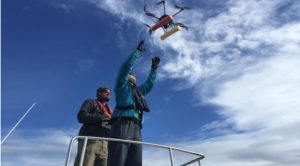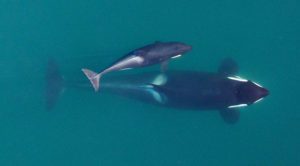
The National Oceanic and Atmospheric Association (NOAA) and the Vancouver Aquarium have joined together to use drones to capture the most detailed footage of killer whale behavior ever seen on film.
Following a group of killer whales known as the Southern Resident killer whales, scientists captured amazing photographs providing significant data on the health of the whales. These whales spend part of the year around the San Juan Islands north of Seattle. Extremely endangered, there are only 81 of them left in the wild. However, this latest research indicates that 5 of the 81 are new calves, good news

for the population. The photo to the right is of an adult female Southern Resident about to surface with her a calf born earlier this year alongside. Future photographic records will allow scientists to monitor the growth of the calf and health of the mother to ensure they are getting an adequate food supply.
Drones allowed the scientists to use a system of photogrammetry, or measurement by photograph, of the whales. Photogrammetry will allow them to accurately measure the growth of the whales over time, estimating the fat percentage, pregnancy rate, and health of the population. Previously, photogrammetry could only be achieved by using a helicopter; drone technology allows for dramatically more photographic material.

NOAA cautions recreational drone operators to review their guidelines page before attempting to get footage of ocean wildlife in order to be sure that drones are used appropriately to protect marine animals. NOAA points out that in addition to having all of the proper permitting, the drones they used were kept at 90 feet above the water at all times in order to avoid disturbing the whales.
More of the photos and footage from the expedition as well as links to a podcast about the trip can be found on NOAA’s website here, or at the Vancouver Aquarium’s site here.

Miriam McNabb is the Editor-in-Chief of DRONELIFE and CEO of JobForDrones, a professional drone services marketplace, and a fascinated observer of the emerging drone industry and the regulatory environment for drones. Miriam has penned over 3,000 articles focused on the commercial drone space and is an international speaker and recognized figure in the industry. Miriam has a degree from the University of Chicago and over 20 years of experience in high tech sales and marketing for new technologies.
For drone industry consulting or writing, Email Miriam.
TWITTER:@spaldingbarker
Subscribe to DroneLife here.







[…] more articles about drones in marine protection on DRONELIFE here and here– and check out more stories on World Oceans Day, organized for the preservation of […]